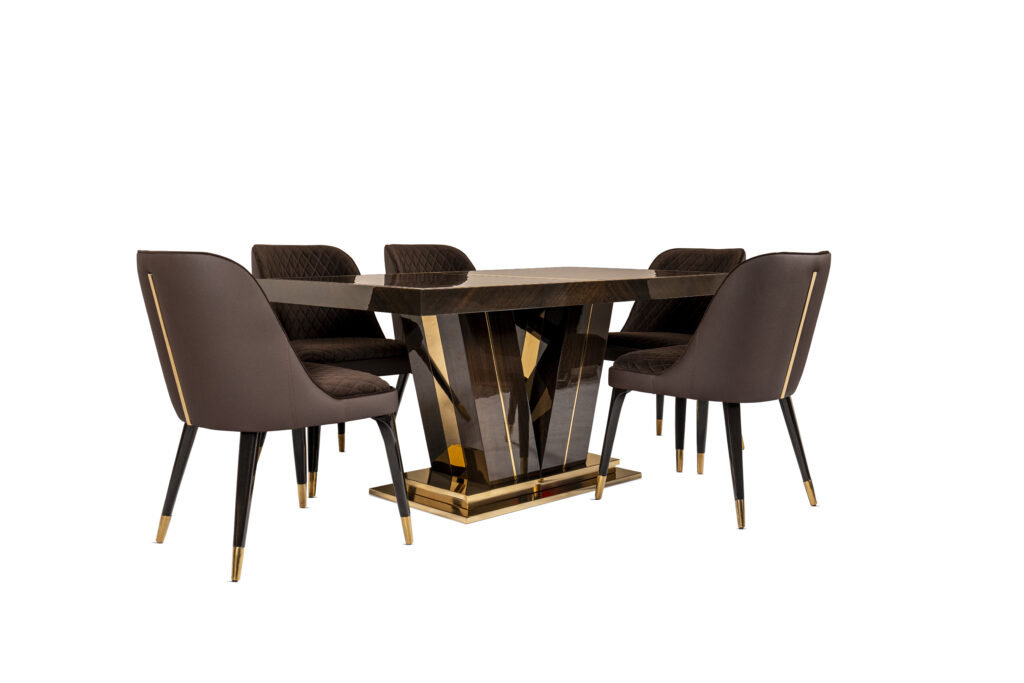Juliette Thomas, Director of Juliettes Interiors, shares an insight into how the business is using AI and why the technology has been a game-changer.
Beyond being a distinguished high-end furniture retailer and interior design studio, Juliettes Interiors also specialises in creating luxury bespoke furniture. It is this arm of the London-based business that has dived into new ways of producing products, with AI at the forefront of its strategy.
“We use AI as a powerful tool when traditional methods have been exhausted, particularly in cases where clients are unable to approve existing selections or when their vision doesn’t align with what’s currently available on the market,” Juliette revealed. “Often, clients come to us with highly specific or unique requirements, and in these instances, AI allows us to visualise concepts that don’t yet exist, bridging the gap between aspiration and reality.”
Taking full advantage of the latest tech, the business has adopted this AI approach as it allows the company to produce low-resolution renders “quickly, efficiently, and at minimal cost—ideal for early-stage client engagement”.
“At this point in the relationship, when there’s no formal commitment to our design service, it’s important to balance quality with efficiency,” Juliette continues. “AI enables us to present highly tailored concepts that reflect the client’s brief, helping them visualise their ideas without requiring a significant upfront investment of time or resources.”


Juliette says that investing the time and expertise into the technology has been paramount to its success so far, dedicating significant effort to understanding how to effectively leverage AI for its specific needs. On the financial side, it has been “relatively minimal”, with the business using AI platforms.
“The value lies in the knowledge we’re building and how we apply that creatively to enhance our offering,” says Juliette. “AI allows us to respond to client needs with greater speed and precision, delivering tailored design concepts quickly and efficiently. As a result, we’re attracting new clients and securing projects that may not have been possible through traditional methods alone. It’s expanding both our creative capabilities and commercial opportunities.”
Furthermore, the business, which has had a strong year so far, has also invested in developing AI-generated designs specifically for its showroom displays – situated on Kings Road in Chelsea – providing an innovative approach that sets the company apart in the market.
“These concepts often push the boundaries of conventional design, and while translating them into reality can present technical challenges—particularly when adapting materials—they allow us to showcase truly unique, forward-thinking interiors that aren’t available elsewhere,” Juliette added. “We’re committed to continually evolving our offering, with a particular focus on integrating AI to enhance the client experience. As the technology develops, we’re actively exploring innovative ways to refine and personalise our service even further.”

Juliette also highlighted areas that the tech can improve on. “AI-generated design is still in its early stages, and while it’s an exciting tool, there are clear areas for improvement. At the moment, AI tends to respond better to directive input rather than restrictions. It struggles with being told what not to do. It also has a tendency to interpret prompts in unpredictable ways, so achieving the desired result often requires persistence and carefully rephrased instructions.
“Additionally, image resolution remains a limitation, which affects how and where we can use the visuals. As the technology matures, we hope to see greater precision, responsiveness, and higher output quality to better align with the standards of luxury design.”
As AI continues to evolve in the furniture space, the way in which Juliettes Interiors is incorporating the tech into its business is truly turning concept into reality – the business has even been certified as Leading Innovators in Luxury Interior Design at this year’s Global Elite Awards for its commitment to excellence and visionary impact. The integration of AI into the world of luxury interior design has opened up extraordinary possibilities.
“From rapidly producing compelling visuals to facilitating creative ideation, these tools can elevate the design process significantly,” Juliette concludes, continuing: “Yet, with this power comes a responsibility—particularly when working with discerning, high-net-worth clients who value transparency, craftsmanship, and authenticity.
“AI-generated imagery can be incredibly effective for sparking conversations, exploring design directions, and visually expressing ideas. However, it’s critical to present these visuals for what they are: conceptual aids, not finished products. While they offer a compelling preview of potential aesthetics, they should never be mistaken for completed, real-world pieces—unless they are translated into physical form through meticulous design and production processes.
“Design professionals must clearly differentiate between conceptual renderings and bespoke pieces that will be manufactured to exacting standards. Clients deserve the assurance that what they’re being shown can—and will—be realised with accuracy, quality, and craftsmanship. Clearly communicating which visuals are AI-generated and which represent actual or in-progress work is essential to maintaining credibility and trust.
“Incorporating AI thoughtfully into your workflow allows for richer dialogue, expanded creativity, and quicker iteration. But its role should remain complementary. Let AI inspire material combinations, layout explorations, or stylistic directions—but always anchor the client experience in your own expertise and the tangible, luxurious reality that only skilled artisans and trusted manufacturers can deliver.
“Ultimately, by being open about how AI is used—framing it as a tool for ideation rather than a promise of production—you reinforce your brand’s integrity. This transparency not only manages expectations but also deepens client confidence, ensuring they feel part of a collaborative, honest, and high-touch design process that lives up to the exclusivity they expect.”
For more information on using AI within the furniture space, check out Juliettes Interiors Buyer’s Guide to AI-Designed Furniture at www.juliettesinteriors.co.uk/ai-designed-furniture-buyers-guide/.















